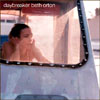
This Week: Beth Orton steps out of the backdrop, Interpol crafts a masterpiece, and a Modest Mouse side project makes a schizophrenic album
Beth Orton

Daybreaker (Astralwerks)
As a long-term fan of Beth Orton's work, I'll admit that what's always pulled me in was the muted seduction of her ignorable, unobtrusive melodies. Central Reservation and Trailer Park were albums whose breathy beats matched the curves of the road as I drove. They compelled daydream, only rarely breaking in with subtle suggestion. But the tracks of Daybreaker refuse to stay in the background. I can't escape the feeling that some mystique may have vanished—that a secret's been let out.
Instead of whispering to us in melodic hypnosis, Orton is crooning and crying, a more deliberate vocal ringing through the sounds of Daybreaker. Her voice undulates between human and woodwind, at its idiosyncratic grandest, in the folksy "Carmella." There's also no ignoring the haunting refrain of "God Song," a countrified repentance in which Orton's elastic vocal is intertwined with the weeping vocal of Emmylou Harris. The song construction of Daybreaker is also more self-aware. Orton's genre-crossing collaboration (including Ryan Adams, the Chemical Brothers, William Orbit, and Ben Watt of Everything but the Girl) is apparent in the tracks' varying styles and focuses. With influence leaping from jazz to electronica, the simple cello-backed "This One's Gonna Bruise" stands apart, a distinctly stripped highlight to the album.
Daybreaker isn't necessarily any less of an album for its shift away from the secretive. It's just an adjustment in mood and strength. Perhaps Beth Orton is no longer interested in blending into the backdrop. And maybe that's the real root of my problem. With stronger vocals and more distinct musical makeup, Daybreaker is certainly less secretive, and the more noticed Beth Orton's music becomes, the less she'll feel like my personal secret. Perhaps its time the secret was let out.
—Liz Tapp
Interpol

Turn on the Bright Lights (Matador)
Interpol could easily have been something we've all heard before. If the guitar were more sparse or the vocal less austere they could easily be a hackneyed attempt at duplicating the post-punk of the early '80s. Instead, they make one of the most tremendously beautiful albums of the year.
Though often compared to Joy Division (and rightly so considering the vocalist's perpetually melancholy singing) Interpol's sound has more in common with The Rock-A-Teens. The group shares The Teens' strong and powerful sound, with singing on the verge of screaming. The near-screaming carries its way though the entire album without once sounding forced or repetitive.
The strength of the songs is less the score than the delivery. There's hardly any lead guitar nor much vocal overdubbing. The melodies are not very distinctive without the lyrics attached to them, and there isn't much ornamentation. There is, however, a genuine beauty to the songs that make this one of the most brilliant albums to come along since the Shins' Oh, Inverted World. The songs are intense and powerful. Two and a half minutes into "Say Hello to the Angels" comes an epiphany not often heard in modern rock music, and we get at least 10 of them in this one album. Variations in simple melodies and chords in the simple 4/4 time somehow create a complicated emotional landscape. And they make it sound so simple.
—Travis Gray
Ugly Casanova

Sharpen Your Teeth (Sub Pop)
Describing this project, featuring members of Modest Mouse and Black Heart Procession, it is difficult to avoid Modest Mouse comparisons because MM vocalist Isaac Brock is a dominant force. But Sharpen Your Teeth has some great moments that transcend all of the easy and obvious comparisons.
The album flows rather effortlessly, quite a feat considering the array of sounds. Hardly a concept album, Sharpen Your Teeth is instead a collection of songs. It is best described and listened to as a sum of its parts. The outside influences also abound—not to the point of being derivative, but just enough to make you wonder. "Hotcha Girls," one of the better songs, is reminiscent of the Will Oldham's Palace, with off-key harmonizing that is strangely comforting. "Smoke Like Ribbons," a song that inspires introspective trances, also deserves the Palace nod. "Spilled Milk Factory" has some elements of '70s soul, as does "Ice on the Sheets," the song with the album's most diverse range of influences. And what is that in the background? Electronica? Maybe a little new wave? Or both?
Meanwhile, "Diamonds on the Face of Evil" is a folk song fit for a graveyard, featuring the inexplicable chorus of "awe shey shaw shey shaw." Go figure.
Black Heart Procession's Pall Jenkins steps out of Brock's shadow to leave his own mark. As part of the alter ego that is Ugly Casanova, Jenkins helped Brock find his less-inhibited instrumental roots while discovering a whole new melody himself. They threw in a seemingly random but probably very calculated selection of genres and created a schizophrenic album that is intriguing and impossible to pin down. But trying to figure it out is half the fun.
—Veronica France

September 5, 2002 * Vol. 12, No. 36
© 2002 Metro Pulse
|